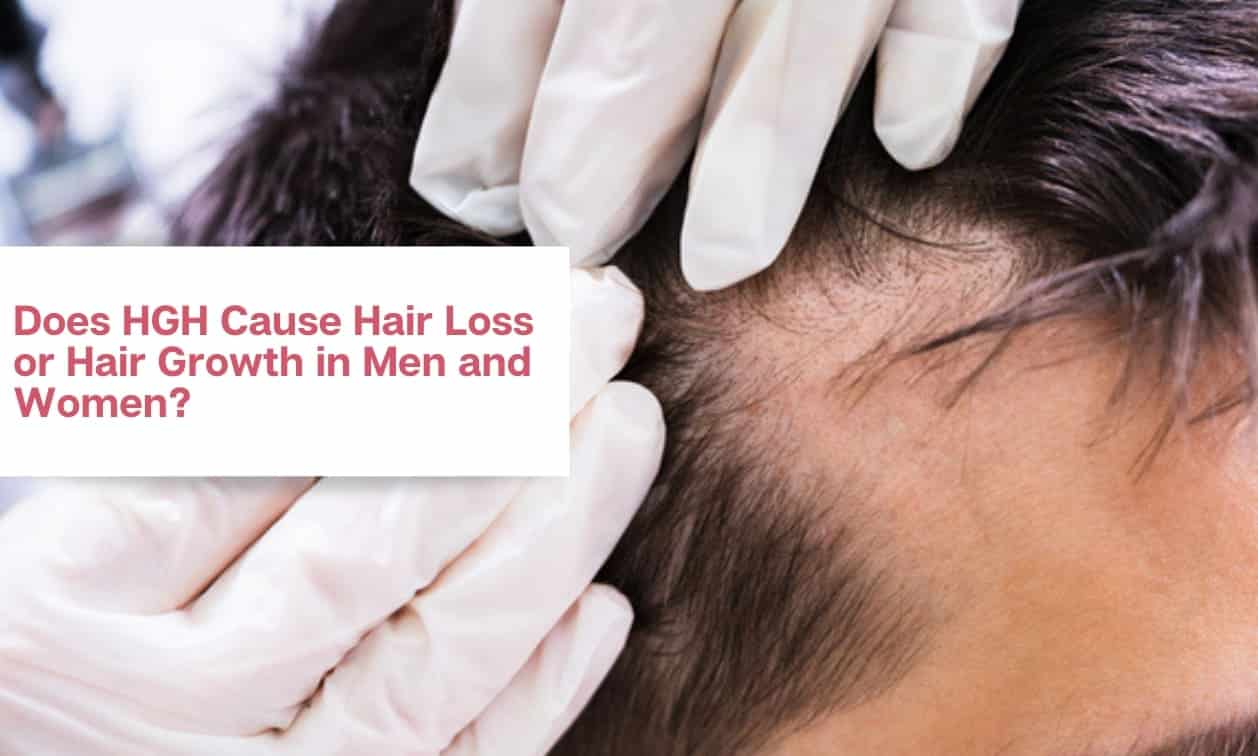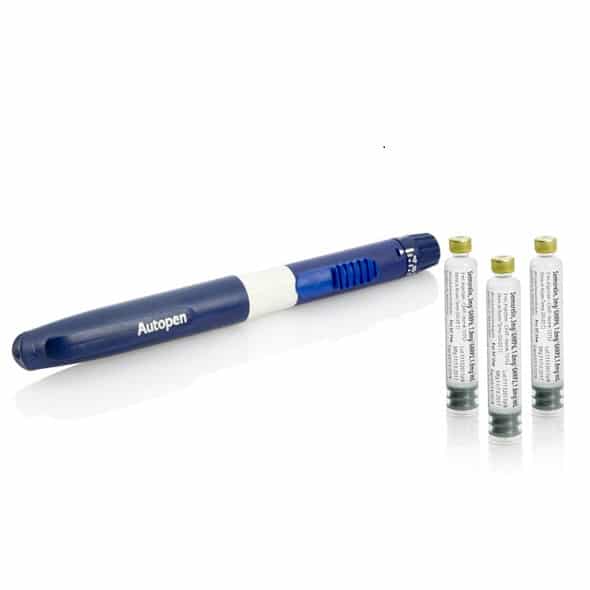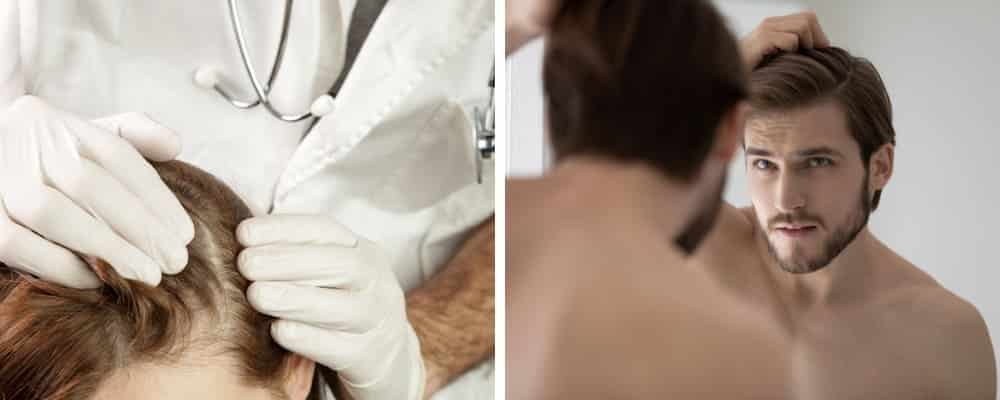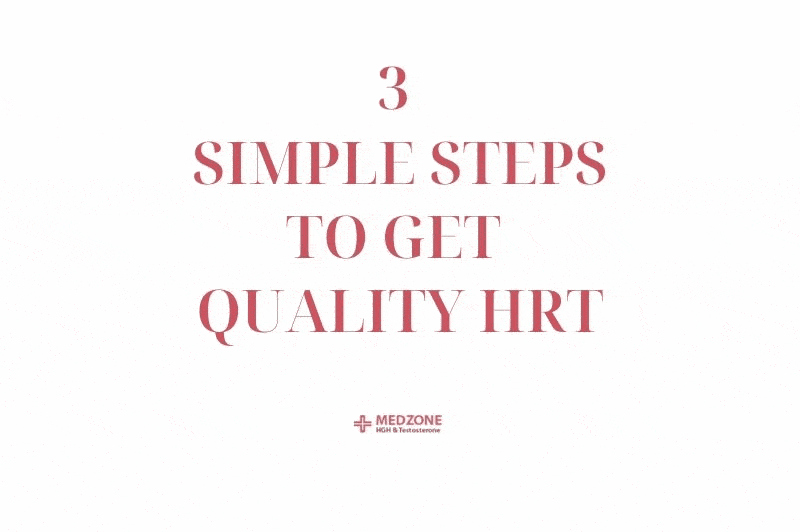
Does HGH Cause Hair Loss or Hair Growth in Men and Women?
Table of Contents
Like many other functions in the body, human growth hormone (HGH) also influences hair growth in men and women. Hair is made up of cells that compose the hair shaft. These cells grow in phases, and since HGH plays a significant role in cellular reproduction assisted by its mediating hormone insulin growth factor 1 (IGF-1), it makes sense that low HGH levels could interfere with hair growth.
The phases of hair growth are as follows:
- Anagen – the active growth phase where the follicle begins to take shape and produce the hair fiber. The hair growth process begins with proanagen, where the follicle proliferates progenitor cells and begins the differentiation process. As the new hair shaft breaks through the skin surface, the metanagen phase begins, with the entire anagen phase lasting for several years. IGF-1, which relies on HGH to promote its production from the liver, stimulates hair follicle growth while maintaining the anagen stage and postponing the catagen stage. Insulin growth factor 1 regulates cellular proliferation and migration during hair follicle development.
- Catagen – at the end of the anagen phase, the hair follicle undergoes a cellular death (apoptosis) regression, losing approximately one-sixth of its diameter. During this catagen phase, it forms a club hair which will eventually be shed from the body. If many hairs enter the catagen phase simultaneously, which can happen during extreme stress, hyperthyroidism, hypothyroidism, following childbirth, in response to medical conditions or treatments, or with vitamin deficiency, it could appear that the hair is thinning.
- Telogen – during this resting phase, about 10 to 15% of the body hairs experience dormancy in the follicle where no hair shaft growth occurs. The time in this phase can vary significantly, with scalp hair shafts lying dormant for up to a year while eyelashes only last a few weeks. Club hairs can last up to about 100 days, and the adult body loses about 100 hairs from the scalp each day. Shampooing can double that amount.
What Hormones Affect Hair Health in Men and Women?
Hormones such as HGH, IGF-1, and androgens can influence hair growth, loss, and health. Healthy hair looks thick and full and grows continually. Unhealthy hair may appear dry, brittle, thin, and without shine. It may grow slowly or not at all.
Human growth hormone receptors (GHR) have been found in the hair follicles, and without the follicles receiving adequate signaling from HGH, they may not proliferate enough to create a strong hair shaft. With low HGH levels decreasing IGF-1 production, there is also a decline in insulin growth factor 1 stimulation to the developing hair shaft. IGF-1 helps prevent the hair follicles from entering the catagen phase to support continued growth.
Androgen hormones such as testosterone, dihydrotestosterone (DHT), progesterone, dehydroepiandrosterone sulfate (DHEAS), androstenedione, and estrogen contribute to hair health, growth, and loss. Unlike HGH and IGF-1, which influence all hair growth, androgen influence depends on where the hair follicle resides on the body. Testosterone, which undergoes conversion to DHT, significantly influences scalp hair follicles.
- Hair Graying
Another aspect of hair health is the graying that occurs as people age. Melanocytes are pigment-providing cells located in the skin, and as the hair shaft pushes its way up and out of the epidermis, the melanocytes provide color. Studies have shown that internal stress, including extremely acute stressful situations, can lead to rapid hair graying. Because stress increases the hormone cortisol secretion, which inhibits HGH and testosterone production, a person may develop growth hormone deficiency.
Additional hormones involved include thyroid hormone, adrenocorticotrophic hormones (ACTH), thyrotrophin-releasing hormone, and others that can interfere with melanogenesis and pigmentation. These hormones are also regulated by the hypothalamic-pituitary axis, which can increase or decrease hormones that influence cortisol production. ACTH stimulates cortisol release.
In instances where stress-induced greying occurs, a decrease in stress once the situation passes has been shown to restore natural hair color. That coincided with reduced cortisol and increased HGH and testosterone production.
Does HGH Boost Hair Growth?
Adults with a growth hormone deficiency (GHD) may find their hair thinner over time due to a lack of HGH signaling to the growth hormone receptors. GHRs are found on most tissues in the body, as well as in the hair follicle.
Most of the body’s HGH secretion occurs at night, during slow-wave sleep. Hair follicles have been shown to demonstrate circadian-dependent clock gene activity. Increased cortisol often counters low HGH levels, which interferes with sleep. These hormone changes also impact hair follicle actions while directly influencing hair growth.
Because the hair follicle behaves as a neuroendocrine organ and shows hormone and receptor expression, it requires the necessary signals to nourish and support hair growth. HGH and IGF-1 act on receptors in the follicle, the outer root sheath keratinocytes, and the hair matrix, promoting cellular proliferation.
Does HGH Cause Hair Loss?
HGH therapy does not cause hair loss. However, a human growth hormone deficiency can influence hair growth directly and indirectly through insulin growth factor 1 production. One study of middle-aged women showed hair loss was more common in those with low circulating IGF-1 levels. These women also had a decrease in beneficial high-density lipoprotein (HDL) cholesterol levels.
Specific conditions associated with growth hormone deficiency, such as Turner syndrome, Prader-Willi syndrome, and Noonan syndrome, have been linked to frontal hairline recession, alopecia, telogen effluvium, and other hair loss issues. These syndromes are also associated with hypogonadism (low testosterone), furthering the connection between androgen hormones and hair growth/loss. A person does not have to have one of the syndromes mentioned above to be diagnosed with alopecia or other hair loss concerns, as hormone changes can lead to many issues.
HGH influences testosterone production, which can lead to lower-than-normal testosterone levels in adults with GHD. Low HGH levels have multiple impacts on hair growth.
Can HGH Therapy Help Treat Hair Loss in Men and Women?
For adults with a GHD diagnosis, hormone replacement therapy (HRT) can provide significant benefits, including boosting hair growth. The benefits of HGH therapy for hair growth are direct and indirect via its IGF-1 signaling.
The hair follicle spends the most time in anagen, with HGH and IGF-1 helping to maintain that status. Because low IGF-1 levels decrease the time spent in anagen, more hairs risk thinning and falling out.
HGH therapy helps increase human growth hormone and IGF-1 levels in the bloodstream, sending signals directly to the hair follicle to support hair growth. Many adults who receive HGH therapy report positive changes in hair growth within 4 to 6 months after starting their treatment.
How to Prevent Hormone-Related Hair Loss?
Maintaining a healthy hormonal balance is the best way to prevent hormone-related hair loss. Low hormone levels create widespread problems, especially HGH, which can lead to fatigue, increased stress, weight gain, hair loss, insomnia, and other problems.
While everyone experiences changes in hormone production as they age, there are some steps to take to help your body maximize hormone production, including the following:
- Get proper sleep at night – 7 to 9 hours to maximize hormone secretion
- Decrease excess weight – obesity interferes with hormone production and conversion, increasing the hormones responsible for hair loss, such as DHT
- Consume a healthy diet high in protein, B vitamins, zinc, and iron, which the hair needs.
- Reduce stress to lower cortisol levels that can interfere with HGH and testosterone production, as well as sleep
- Exercise regularly to help stay in shape and boost hormone secretion
- Avoid unhealthy habits such as smoking and excessive alcohol consumption
These changes can help improve hormone production. Of course, when low hormone levels are present, hormone replacement is often the best option to restore balance and proper bodily functions.

Conclusion
Human growth hormone plays a significant role in hair growth, directly and indirectly, through IGF-1 signaling. HGH therapy can provide significant benefits if hair thinning or loss is due to hormonal imbalance, including growth hormone deficiency.
HGH treatment increases insulin growth factor 1 and testosterone levels to help support the growing hair follicle. Our hormone specialists will check your blood for hormone deficiency and imbalance and create a personalized treatment plan to address your symptoms and concerns.
Frequently Asked Questions
- Does HGH grow hair back?
Many factors contribute to hair loss, with HGH deficiency being one of them. HGH therapy can help improve hair growth in men and women with growth hormone deficiency.
- Can HGH reverse balding?
If the cause of balding is low growth hormone levels, then HGH therapy may help regrow hair in the follicles. HGH cannot always reverse balding, but it may provide significant results.
- Does HGH block DHT?
Low HGH levels have been linked to increased 5-alpha reductase enzymatic activity, which converts free testosterone into DHT, further lowering testosterone levels. HGH therapy has been found to suppress 5-alpha reductase activity.
- Can HGH reverse gray hair?
Stress increases cortisol and decreases HGH levels. Studies have shown hair can turn gray due to stress, and hair can sometimes regain its color when stress is gone (and HGH levels also increase). HGH also supports cell regeneration, including melanocytes.
- Does HGH make hair thicker?
Because HGH and its mediating hormone IGF-1 work on the hair follicle to help proliferate cells, treatment with HGH therapy can help make each hair strand grow thicker and stronger.


